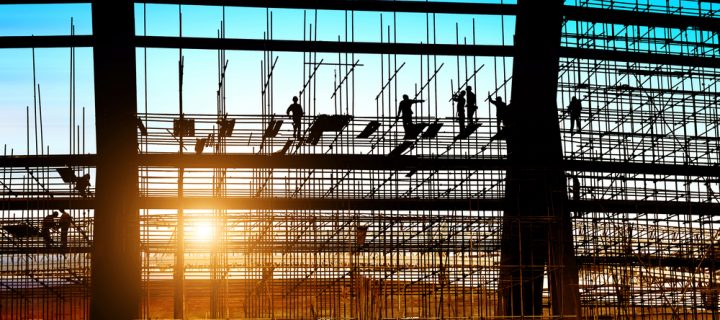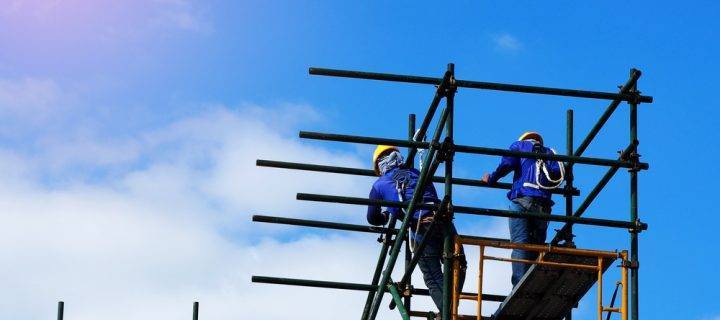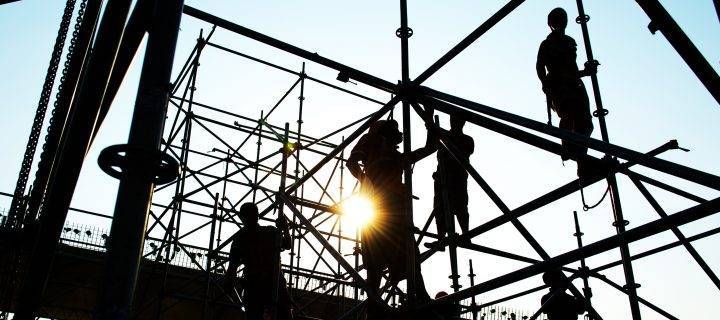The UK government has recently announced a £3 billion plan to upgrade a number of buildings across the country, with scaffolding set to play a big part. Homes, schools and hospitals will be part of this widescale upgrade, with the hope of creating 120,000 construction jobs. Network Scaffold is the leading provider of scaffolding across Derby and Nottingham, plus we can also offer access scaffolding, edge protection and alloy towers. Here we are going to look at this announcement and how scaffolding can be effectively utilised on commercial and domestic property upgrades. Explaining Construction Government Support Homeowners have been offered the chance to save on home upgrades as part of the government’s £2 billion Green Homes Grant. Additionally, £1 billion has been announced to improve the energy efficiency of publicly owned buildings. With grants offered to cover green home improvements ranging from the insulation of walls, floors and roofs plus the installation of double or triple glazing. The beauty of all of these sort projects is that they will all require scaffold services. Business and Energy Secretary Alok Sharma said of the announcement, “Our plan to upgrade the nation’s buildings and help build back better is good news for jobs, the environment and people’s back pockets, as we reduce emissions and help cut energy bills. “I urge everyone to visit the Green Home Grants website to see how they can make the most of this fantastic scheme.” Safe and Reliable Scaffolding Network Scaffold offers a safe and reliable range of scaffolding, especially during these challenging times of COVID-19. We have implemented a progressive environmental policy with a strong commitment to supporting our environment and ensuring as little disruption as possible. If you would like a no-obligation quote for our scaffold services, please contact us today. Network Scaffold Services are based in Derby near the operating depot nearby to the Toyota plant at...
Read Moreabout Scaffolding Plays a Part in Government Construction DriveAs a member of the Scaffolding Association, Network Scaffold has been following the latest information released regarding new and adjusted working practices in the wake of the Coronavirus pandemic. For our latest blog, we are going to summarise the main points that all scaffolders and their clients should be aware of. 7 Ways Scaffolding Practices are Changing 1. Facemask Guidance – The HSE has issued a safety alert that states that all employers and suppliers should not purchase or use KN95 facemasks as PPE. 2. SMAS Worksafe Applications Reverted – With a lot of the industry back to work, whilst following social distancing guidelines, changes implemented to SSIP assessments have been removed. The process will now revert to normal from 30th June. 3. NHS Test and Trace – The NHS Test and Trace service has been launched nationwide. The guidance states that if you have come into close contact with someone who tests positive you will need to isolate for 14 days, even if you are showing no symptoms. 4. Safe Working Guidance – The UK government has released updated guidance for people who work in or run outdoor working environments, which has particular relevance for construction sites. 5. PPE Advice from HSE – The HSE has set up a dedicated section on their site regarding PPE for non-healthcare businesses. 6. Construction Workers Testing Eligibility – The UK government has confirmed that construction workers are eligible for coronavirus tests. This helps to safeguard site workers but please note, this is only intended for those showing symptoms of coronavirus. A coronavirus test can be booked on the Government’s website. 7. Scaffolding-specific Guidance on Social Distancing – Public Health England has issued sector-specific guidance on social distancing in the workplace. It states that construction work can continue in accordance with social distancing guidelines. There is the continued importance of frequent handwashing, good ventilation plus having a considered approach to enclosed machinery. Talk to our Scaffolding Specialists Today If you are looking for scaffolding services in Derby or Nottingham, don’t hesitate to get in touch with Network Scaffold...
Read Moreabout COVID-19 Scaffolding Advice from Scaffolding AssociationThe importance of a preliminary tie test for any scaffolding used in construction works cannot be understated. This task should be carried out away from the area where the scaffold is erected which prevents stressing on the facade where it is being positioned. A preliminary test load has different rules, based on the type of Tie which makes it crucial to know the type of Tie being used to ensure an accurate design is provided. Five tests need to be carried out in each different base material of the project which are carried out on sample anchors in the same base material. This again should take place away from areas which are being used and must not be used in the job at any time. The tests include pulling without slipping for a working load of two non-nylon tie, then take further consideration for three times using a nylon-based tie. If all of these tests pull without slipping for a working load of 2 non-nylon tie then it is okay and no further consideration needs to be taken. If the ties move or slip during this stage then the tie would fail. Non-nylon ties will need either the average failure load divided by three for the maximum permissible tie load or the worst-case failure on the weakest test which is then divided by 2. The Right Time to Test Scaffold Ties Using our decades of experience, Network Scaffold understand these tests will take place between the design phase and the start of construction. The tie load information for the tests to take place, needs to be clearly stated to the scaffolding contractor for the preliminary testing. Proof testing is sometimes confused with the overall tie test load for scaffolding but these are two different practices. This testing is only quality checking when the scaffold is in place. Proof testing needs to be carried out with a minimum of three ties or 5% of all ties; whichever is greater. Contact the Scaffolding Specialists If you have any questions about scaffolding ties, please get in touch with Network Scaffold today. We are the leading supplier of scaffolding and access scaffolding in Derbyshire and the surrounding...
Read Moreabout Your Guide to Testing Scaffolding TiesAcross the scaffolding industry, the number of accidents and injuries fell to an all-time low in 2019. This is according to the NASC, with just 74 incidents reported throughout the calendar year. Explaining the NASC Safety Report These figures were released in the NASC 2020 Safety Report, a document which analyses accident and injury stats for all members, which encompasses 17,000 scaffolding operatives in the UK. Another fantastic statistic revealed that 99% of NASC member-employed operatives went through the whole of 2019 injury-free. For the seventh year in a row, there was also no operative fatalities. The 74 incidents equate to one injury for every 230 operatives, a significant improvement on last year’s one injury for every 150 operatives. From the total incidents, 13 were recorded as major (meaning they required hospital treatment) with the rest recorded as over 7-days. Both of these figures were also the lowest on record. Slips, trips and falls accounted for the majority of reported incidents – 28 in total. This is now the 15th year in a row that slips, trips and falls have been the main cause of injury to operatives. This accounts for 21% of injuries in 2019. Lynn Way, NASC President commented, “The 2020 Safety Report demonstrates in no uncertain terms that NASC members are incredibly safe, and justifies the decision taken by an increasing number of main contractors to specify NASC-only for their scaffolding requirements.” The Safest Scaffolding in Derby Our first priority here at Network Scaffold is the safety of both our staff, on-site workers and members of the public – dependant on the type of job. This is why our Health and Safety Policy is so robust, encompassing – Compliance with the latest laws and regulations Effective communication relating to safety on-site Collaboration with customers and suppliers to ensure jobs are delivered safely Constant re-assessment of our procedures to adapt to new site practices We also support any worker who refuses to work on a site due to poor health and safety Network Scaffold is the leading provider of scaffolding in Derby; if you would like to know more about our services please contact us...
Read Moreabout Safe Scaffolding Means Less AccidentsNew guidance has been released to scaffolders with changes to working practices due to the Coronavirus pandemic. Information from the Department for Business, Energy and Industrial Strategy covers all those working outdoors and managing outdoor working environments (such as scaffolding). The intention is to give workers enough freedom within a practical framework to complete their work during the pandemic. Network Scaffold has been extremely strict with our working practices since the Coronavirus swept across the country. We will always look to complete our work in the safest environment for all involved; whilst adhering to social distancing techniques. Coronavirus Testing Available for Construction Workers The UK government has revealed that millions of more people are now eligible for Coronavirus tests, including construction workers. At this stage, tests are only intended for those showing symptoms of the virus. An expansion in testing has been made possible because of the introduction of home-testing kits. Mobile units are also been employed; staffed by the armed forces. Construction workers are able to book a test on the government’s test-booking website. 10 New Steps for Safety On-Site Here are ten simple steps that have been introduced to help keep construction workers safe and able to do their jobs. Regular updates on actions being taken to reduce risks of exposure in the workplace Make sure all contact numbers and emergency contact details are fully up to date Ensure managers can spot symptoms of coronavirus and know the actions they need to take Operatives are wearing gloves when handling materials and equipment Wash stations are provided with hot water and soap Encourage all staff to wash their hands regularly Schedule break times to reduce the number of people together in canteens at one time Avoid using shared pens when signing in and out of sites Wash or sanitise hands after the use of biometric sign-in. Provide hand sanitiser and tissues for workers Order Your Scaffolding from Network Scaffold Today We understand that working practices are changing in these unprecedented times but if require scaffolding for your project please contact us today. Network Scaffold provides scaffolding for customers across Derby, Nottingham and...
Read Moreabout How Scaffolding Is Changing Due to COVID-19Scaffolding inspections are an integral part of ensuring the work being conducted is safe and adheres to industry standards. Here at Network Scaffold, we understand the importance of ensuring the safety of our team, other workers and the general public (depending on the location of the site). For our latest blog, we are going to talk about workers who can undertake scaffold inspections. The Importance of Qualified Scaffolding Inspectors Legislation states that anyone carrying out inspections must be competent, meaning the person must have the necessary training, knowledge and experience. As a minimum, they should have one of the following qualifications – 1. A Construction Industry Scaffolders Record Scheme (CISRS) cardholder, provided their employer demonstrates necessary knowledge and experience. 2. A CISRS Advanced Scaffolder cardholder, again provided their employer demonstrates sufficient knowledge and experience. 3. A CISRS Scaffolding Supervisor cardholder, plus if the person also holds the Advanced Scaffolders card they are deemed competent to inspect advanced structures. 4. A person who has taken the Basic Scaffold Inspection Course, and can demonstrate the necessary knowledge and experience from the course. 5. A person who has taken the Advanced Scaffold Inspection Course, and again shows sufficient knowledge and experience gained from the course. 6. Persons required to carry out inspections of System Scaffolds must have their card endorsed with the product selected plus attending the basic scaffold inspection course and attend an approved product training course for the specific system scaffold required. Speak to the Scaffold Specialists Today If you require scaffolding for your next project, look no further than Network Scaffold; the leading provider in Derby and the surrounding areas. Network Scaffold can also provide alloy towers, edge protection and access scaffolding for both domestic and commercial projects. If you have any more questions about scaffolding, please contact us or visit our FAQ page to see if answers are already provided on this...
Read Moreabout Who is Competent for Scaffold Inspections?





